Related Research Articles

William Lyon Mackenzie King was a Canadian statesman and politician who was the tenth prime minister of Canada for three non-consecutive terms from 1921 to 1926, 1926 to 1930, and 1935 to 1948. A Liberal, he was the dominant politician in Canada from the early 1920s to the late 1940s. King is best known for his leadership of Canada throughout the Great Depression and the Second World War. He played a major role in laying the foundations of the Canadian welfare state and established Canada's international reputation as a middle power fully committed to world order. With a total of 21 years and 154 days in office, he remains the longest-serving prime minister in Canadian history.
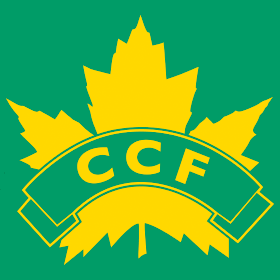
The Co-operative Commonwealth Federation was a federal democratic socialist and social-democratic political party in Canada. The CCF was founded in 1932 in Calgary, Alberta, by a number of socialist, agrarian, co-operative, and labour groups, and the League for Social Reconstruction. In 1944, the CCF formed one of the first social-democratic governments in North America when it was elected to form the provincial government in Saskatchewan.
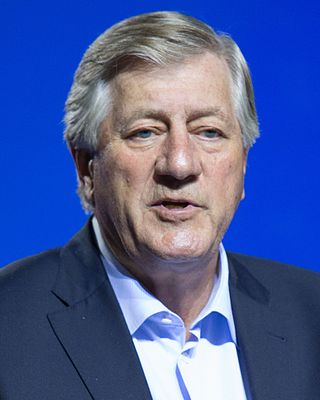
Michael Deane Harris is a retired Canadian politician who served as the 22nd premier of Ontario from 1995 to 2002 and leader of the Progressive Conservative Party of Ontario from 1990 to 2002. During his time as party leader, he guided the Ontario PC Party toward Blue Toryism, advocating for the "Common Sense Revolution", his government's program of deficit reduction in combination with lower taxes and budget cuts.
The goods and services tax is a value added tax introduced in Canada on January 1, 1991, by the government of Prime Minister Brian Mulroney. The GST, which is administered by Canada Revenue Agency (CRA), replaced a previous hidden 13.5% manufacturers' sales tax (MST).

The Communist Party of Canada is a federal political party in Canada. Founded in 1921 under conditions of illegality, it is the second oldest active political party in Canada, after the Liberal Party of Canada. Although it does not currently have any parliamentary representation, the party's candidates have previously been elected to the House of Commons, the Ontario legislature, the Manitoba legislature, and various municipal governments across the country.
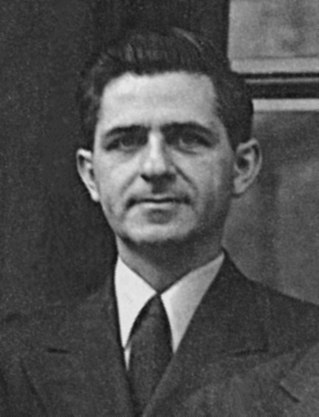
David Lewis was a Canadian labour lawyer and social democratic politician. He was national secretary of the Co-operative Commonwealth Federation (CCF) from 1936 to 1950 and one of the key architects of the New Democratic Party (NDP) in 1961. In 1962, he was elected as the Member of Parliament (MP), in the House of Commons of Canada, for the York South electoral district. While an MP, he was elected the NDP's national leader and served from 1971 until 1975. After his defeat in the 1974 federal election, he stepped down as leader and retired from politics. He spent his last years as a university professor at Carleton University, and as a travel correspondent for the Toronto Star. In retirement, he was named to the Order of Canada for his political service. After suffering from cancer for a long time, he died in Ottawa in 1981.
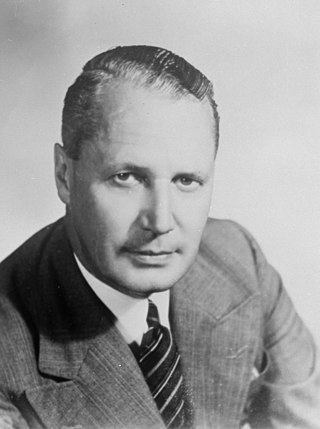
George Alexander Drew was a Canadian politician. He served as the 14th premier of Ontario from 1943 to 1948 and founded a Progressive Conservative dynasty that would last 42 years. He later served as leader of the federal Progressive Conservative Party and Leader of the Official Opposition from 1948 to 1956.

The worldwide Great Depression of the early 1930s was a social and economic shock that left millions of Canadians unemployed, hungry and often homeless. Few countries were affected as severely as Canada during what became known as the "Dirty Thirties", due to Canada's heavy dependence on raw material and farm exports, combined with a crippling Prairies drought known as the Dust Bowl. Widespread losses of jobs and savings ultimately transformed the country by triggering the birth of social welfare, a variety of populist political movements, and a more activist role for government in the economy.
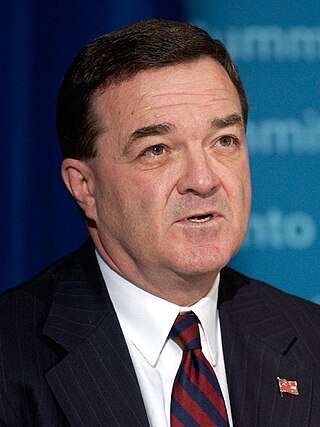
James Michael Flaherty was a Canadian politician who served as the federal minister of finance from 2006 to 2014 under Conservative Prime Minister Stephen Harper.

The Co-operative Commonwealth Federation – The Farmer-Labor Party of Ontario, more commonly known as the Ontario CCF, was a democratic socialist provincial political party in Ontario that existed from 1932 to 1961. It was the provincial wing of the federal Co-operative Commonwealth Federation (CCF). The party had no leader in the beginning, and was governed by a provincial council and executive. The party's first Member of the Legislative Assembly (MLA) was elected by voters in the 1934 Ontario general election. In the 1937 general election, no CCF members were elected to the Ontario Legislature. In 1942, the party elected Toronto lawyer Ted Jolliffe as its first leader. He led the party to within a few seats of forming the government in the 1943 general election; instead, it formed the Official Opposition. In that election, the first two women were elected to the Ontario Legislature as CCFers: Agnes Macphail and Rae Luckock. The 1945 election was a setback, as the party lost most of its seats in the Legislature, including Jolliffe's seat. The party again became the Official Opposition after the 1948 general election, and defeated the Conservative premier George Drew in his seat, when Bill Temple unexpectedly won in the High Park constituency. The middle and late 1940s were the peak years for the Ontario CCF. After that time, its electoral performances were dismal, as it was reduced to a rump of two seats in the 1951 election, three seats in the 1955 election, and five seats in the 1959 election. Jolliffe stepped down as leader in 1953, and was replaced by Donald C. MacDonald.
Frances Lankin,, is a Canadian senator, former president and CEO of United Way Toronto, and a former Ontario MPP and cabinet minister in the NDP government of Bob Rae between 1990 and 1995. From 2010 to 2012, she co-chaired a government commission review of social assistance in Ontario. From 2009 to 2016, she was a member of the Security Intelligence Review Committee.
John Jeffrey Leal is a Canadian politician who serves as the 63rd and current mayor of Peterborough. Previously, he was a member of the Legislative Assembly of Ontario from 2003 to 2018 who represented the riding of Peterborough. He served in the cabinet of Kathleen Wynne. On October 24, 2022 he was elected mayor of Peterborough.

Real estate economics is the application of economic techniques to real estate markets. It tries to describe, explain, and predict patterns of prices, supply, and demand. The closely related field of housing economics is narrower in scope, concentrating on residential real estate markets, while the research on real estate trends focuses on the business and structural changes affecting the industry. Both draw on partial equilibrium analysis, urban economics, spatial economics, basic and extensive research, surveys, and finance.

The 1919 Ontario general election, held on October 20, 1919, elected 111 Members of the 15th Legislative Assembly of Ontario ("MLAs"). The United Farmers of Ontario captured the most seats but only a minority of the legislature. They joined with 11 Labour MPPs and three others to form a coalition government, ending the 14-year rule of Ontario's Conservatives. This is one of the few examples of coalition government in Canadian history.
Robert GoldwinElgie was a Canadian lawyer, surgeon and politician. Elgie was elected to the Legislative Assembly of Ontario in 1977 and sat as the member of Provincial Parliament (MPP) for York East until 1985. A member of the Progressive Conservative (PC) Party, Elgie served in the provincial cabinet from 1978 to 1985, notably as Minister of Labour. He was a member of the Ontario Press Council from 2001, serving as chair from 2006 until his death.
The New Democratic Party fielded a full slate of 308 candidates in the 2006 Canadian federal election. It won 29 seats in the election to remain the fourth-largest party in the House of Commons. Many of the New Democratic Party's candidates have their own biography pages; information about others may be found here.

Sir Édouard Percy Cranwill Girouard, was an Empire enthusiast, a Canadian railway builder, High Commissioner of Northern Nigeria and the East Africa Protectorate and British industrialist.

Anthony Charles Sousa is a Canadian politician who has served as the Member of Parliament from Mississauga-Lakeshore since December 12, 2022. He previously served as the Minister of Finance for Ontario from 2013 to 2018. A member of the Ontario Liberal Party, Sousa was elected to represent Missisuaga South in the Legislative Assembly of Ontario in 2007. He joined the provincial cabinet as the minister of labour in 2010 and became Ontario's minister of citizenship and immigration in 2011. In 2022, Sousa ran as the federal Liberal candidate in the Mississauga-Lakeshore by-election which was held on December 12, 2022. Sousa won the election, defeating 39 other candidates.
Ontario is a province of Canada.

There were two types of corporations at work in the Upper Canadian economy: the legislatively chartered companies and the unregulated joint stock companies. These two business forms had different legal standing; chartered corporations had a "separate personality" - they were a legal person quite distinct from its members or shareholders, a legal fiction which protected those shareholders with limited liability. In contrast, joint stock companies were made illegal by the English Bubble Act of 1720. Joint stock companies were considered extensive partnerships under common law, and English legislation limited these to a maximum of six partners. Without incorporation, the company was not considered a "separate personality." It could not hold property; this was held by trustees, who usually had to provide a bond or security. Without incorporation, the company could neither sue nor be sued at law. And without incorporation, shareholders were personally responsible for the debts to the company to the full extent of their personal property; shareholders were not protected by limited liability. There were, then, significant legal hurdles that made the joint stock company an unwieldy form of partnership.
References
- ↑ Saunders, Christopher (1988). The Making of the South African Past, Major Historians on Race and Class (paperback). Cape Town: David Philip Publishers. Retrieved 2007-08-18.
- ↑ Evans, Ivan (1997). Bureaucracy and Race : Native Administration in South Africa. Berkeley: University of California Press. Retrieved 2007-08-18.
- ↑ "ONTARIO SECURITIES COMMISSION REVIEW". Archived from the original on 2014-03-18. Retrieved 2023-08-27.
- ↑ "New Books 53/01 November 16, 2001 | Western Libraries". Archived from the original on 2014-10-15. Retrieved 2014-01-07.
- ↑ "Canadian mineral policy past and present: The ambiguous legacy : by David Yudelman" . Retrieved 2023-08-27.